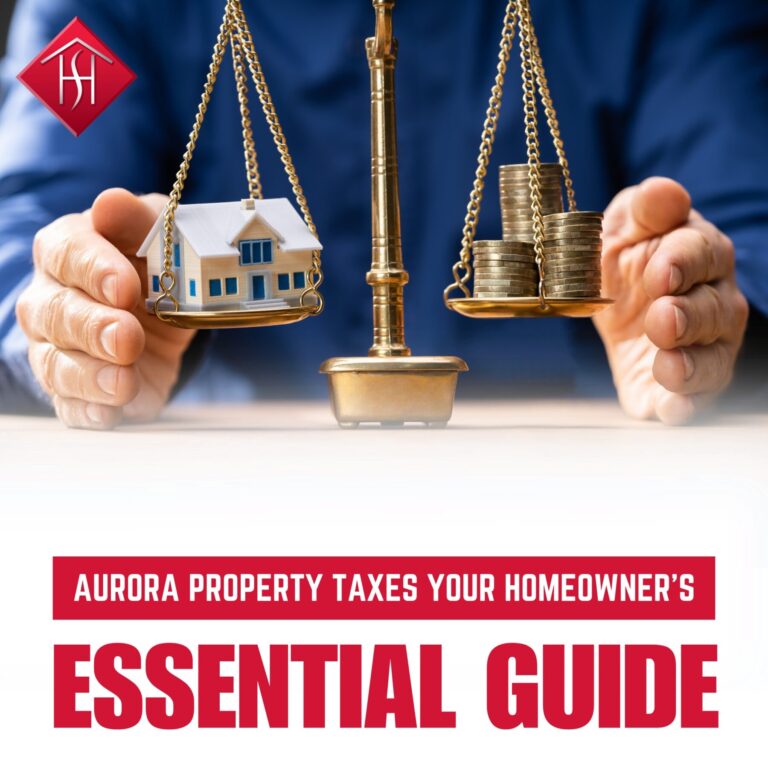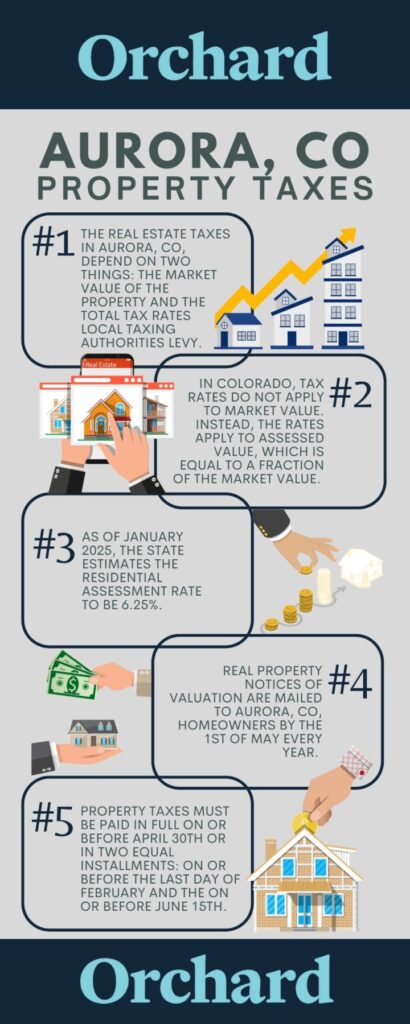In Aurora, CO, the entirety of property taxes collected is used to support local services in the county in which it is collected. The city spans across three counties: Adams County, Arapahoe County, and Douglas County.
If you’re planning to buy a new home, it’s important to know that your property taxes can significantly impact the amount of your mortgage.
Here are a few things you should know about Aurora, CO property taxes before you make a real estate purchase, and even after you are settled into your new home.

How Property Taxes Are Calculated in Aurora, CO
Aurora Colorado real estate tax depend on two things: the market value of the property and the total tax rates local taxing authorities levy.
Homes are valued in two-year cycles. The values are based entirely on comparable sales, so the price of similar homes sold in your area determines the value of your home.
In Colorado, tax rates do not apply to market value. Instead, the rates apply to assessed value, which is equal to a fraction of the market value. That fraction is called the residential assessment rate, and it is recalculated regularly by the state.
As of January 2025, the state estimates the residential assessment rate to be 6.25%. Given this, if your property has a market value of $300,000 (based on comparable sales), the assessed value is approximately $18,750, and your tax rate only applies to this amount.

Aurora, CO Property Tax Rates
Taxing authorities in the state of Colorado calculate tax rates based on how much revenue is needed. That means that rates change as often as their revenue needs to shift.
Property tax rates are expressed in mills, which are equal to $1 for every $1,000 of the property value. For example, a tax of 10 mills on a home with an assessed value of $10,000 is equal to $100.
The effective tax rate is the actual amount paid annually divided by the value of the property. If you pay $1,500 in taxes annually and the market value of your home is $100,000, then your effective tax rate is 1.5%.
The table below shows the effective tax rates for Adams County, Arapahoe County, and Douglas County, along with the median property tax payments and median home values.
| County | Median Annual Property Tax Payment | Median Home Value | Average Effective Property Tax Rate |
|---|---|---|---|
| Adams County | $2,581 | $425,000 | 0.61% |
| Arapahoe County | $2,623 | $480,500 | 0.55% |
| Douglas County | $3,490 | $635,100 | 0.55% |

Property Tax Payment Schedule in Aurora, CO
Real property notices of valuation are mailed to Aurora, CO, homeowners by the 1st of May every year. Those who disagree with their home’s valuation have until June 1st to protest.
The notices list the location, classification, the characteristics relevant to value, and the actual value of the property for both the previous and current years.
Property tax bills, reflecting the taxes due for the preceding year, are mailed out after January 1st.
Under current law, these property taxes must be paid either in full on or before April 30th or in two equal installments: the first is due on or before the last day of February, and the second is due on or before June 15th.
For property tax payments made for property tax years commencing on or after January 1st, 2025, homeowners may pay in four installments:
1st installment: On or before the last day of February
2nd installment: On or before April 30th
3rd installment: On or before July 15th
4th installment: On or before September 15th

Property Tax Exemptions in Aurora, CO
Under the Colorado Constitution, senior citizens, surviving spouses of senior citizens, disabled veterans, and gold star spouses may qualify for property tax exemption.
One of the most widely used property tax exemptions in the state is the Senior Property Tax Exemption.
This exemption is available to residents who are 65 years or older and have lived in their primary residence for at least 10 consecutive years. It reduces the taxable value of the home by 50% of the first $200,000, resulting in significant savings, especially for retirees living on a fixed income.
If an applicant owns several homes in the area, the exemption will only be applied to the property that the applicant occupies as his or her primary residence.
Similarly, the Disabled Veteran Property Tax Exemption is offered to veterans who have a 100% permanent service-connected disability. This benefit also applies to the first $200,000 of a home’s value, reducing it by 50%.
Both exemptions require an application through the local county assessor’s office. The deadline for applications is July 15th of the year in which the exemption is being claimed. If approved, the tax reduction will be reflected in the following year’s property tax bill.
For additional information regarding the property tax exemption, you may contact the Colorado Division of Property Taxation at (303) 864-7777 or your county assessor.
Conclusion
Knowing how property taxes can significantly impact the amount of your mortgage is important when you’re considering buying a new home.
If you’d like to explore the real estate offerings in Aurora, CO, please give me a call today at 702-506-5006 or send me an email at leahceller@gmail.com to schedule an appointment.
Frequently Asked Questions
How are property taxes calculated in Aurora, Colorado?
Property taxes in Aurora, CO, depend on two things: the market value of the property and the total tax rates that local taxing authorities levy. Homes are valued in two-year cycles based on comparable sales in your area.
What is the property tax rate in Aurora, CO?
Property tax rates are expressed in mills, which are equal to $1 for every $1,000 of the property value.
What are the deadlines for paying property taxes in Aurora?
Under current law, property taxes in Aurora must be paid either in full on or before April 30th or in two equal installments: the first is due on or before the last day of February, and the second is due on or before June 15th.
What property tax exemptions are available in Aurora, CO?
Property tax exemptions in the state include the Senior Property Tax Exemption and the Disabled Veteran Property Tax Exemption. Both benefits apply to the first $200,000 of a home’s value, reducing it by 50%.
Who do I contact with questions about my Aurora property taxes?
For additional information regarding property taxes, you may contact the Colorado Division of Property Taxation at (303) 864-7777 or your county assessor.





